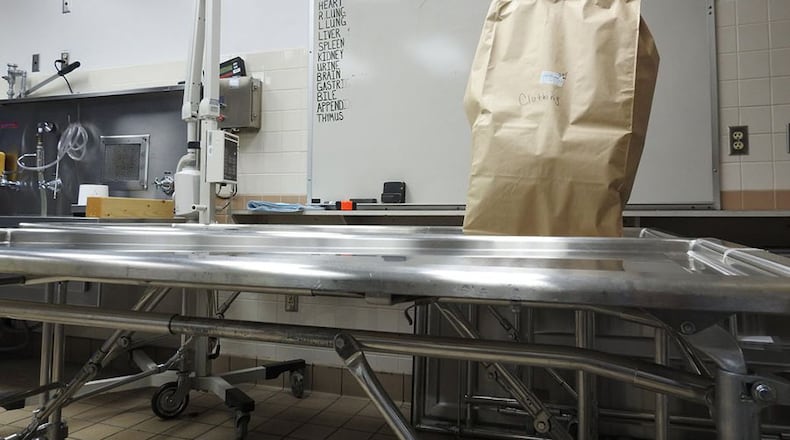The expansion project is expected to cost between $40,000 to $50,000, which the county will pay for using capital funds.
“We are constantly operating at capacity just in our day-to-day workload, and then you throw in this drug epidemic now, and it’s really maxed,” said Kent Harshbarger, Montgomery County coroner.
For Montgomery County, the number of drug overdoses is around 200, a decrease from last year. But overdoses are up almost everywhere else. The coroner’s office in Dayton serves more than 25 other counties.
“We are probably doing at least one a day, if not more,” Harshbarger said. “We’re going to set records this year as far as these numbers, just investigations that we’ve done and autopsies that we’ve done.”
The cooler expansion will improve the racking system and should add eight to 12 spaces for bodies, Harshbarger said.
Harshbarger said the facility is constantly at capacity, and once space in the refrigerated unit runs out, trays are used. The coroner also uses an emergency refrigerated trailer for body storage when its cooler reaches capacity.
Coroners statewide are working together on proposals to seek additional funding to help with the storage issues.
The redesign project — expected to be completed early next year — also will add about six to nine trays, increasing the facility’s capacity to about 40 bodies from about 24 today, said Ken Betz, director of the coroner’s office and the Miami Valley Regional Crime Laboratory.
Betz said overcrowding at the morgue is partly attributable to the deadly heroin epidemic. But the economy and poverty also has played a role.
The coroner’s office will end up processing more than 200 indigent bodies this year, which often must be held for a week or longer as jurisdictional and ownership details are sorted out, said Betz.
Many people who die have no assets and little or no income, and often their relatives do not want or cannot handle the financial responsibility of cremation or burial.
The jurisdictions where they died typically are financially responsible for the costs of final arrangements. Establishing indigency takes time and involves other procedural issues.
Families also are taking longer to identify funeral homes where to send the remains of their deceased relatives, which results in longer stays at the morgue, Betz said.
About the Author

